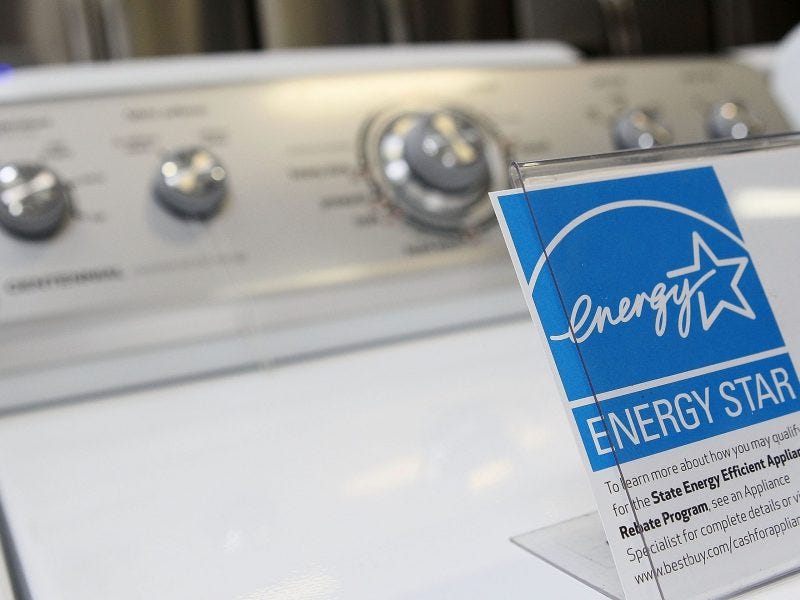🔋Energy Efficient
Increasing energy efficiency does not yield the results you would expect.
If you found this article interesting, click the like button for me! I would greatly appreciate it :)
Typically, the amount of energy used by a country directly relates to the GDP per capita of that country and by further extension, the standard of living. The reasonable conclusion would then be obtaining as much energy as possible to create a better standard of living for everyone. This of course comes in direct conflict with those concerned with climate change, as fossil fuels constitute 76% of all primary energy consumption.
The most optimistic renewables proponents often use higher energy efficiency as a reason why this relationship can decouple. This is great, as we could maintain the same energy use (and standard of living) while decreasing the amount of energy consumption and emissions. Since it is also from renewable sources, it also has low emissions. Win-win.
This conclusion has a fatal flaw, the Jevons paradox. First introduced in 1865, it suggests that efficiency improvements increase rather than decrease consumption. At the time, Britain was concerned with coal supplies. The Watt steam engine was invented, cutting the coal usage required to generate the same power in half. Jevons correctly predicted that the demand for coal would increase more than that offset from the efficiency improvement. While other factors may dampen the effect, his principle can be extended to many different aspects of the economy such as fuel efficiency, air conditioning, and overall energy use.
This has two implications, with the first being that if we assume renewables are successful and can reduce the energy intensity (increased efficiency) globally, the expected result would be higher energy consumption. The reason would be that lower-cost energy entices people to use more and gives access to new people, which increases the total consumption. People will alter their behavior if new efficiency arrives and they can do more with less or for cheaper. While renewables proponents get the conclusion wrong, I have also argued that their premise is also unlikely due to the low EROI for renewables for example.
Energy intensity - energy used per unit of GDP (output)
Energy efficiency - output (GDP) per unit of energy, the inverse of intensity
The second implication is for overall energy use. Since 1970, global energy intensity has decreased by 50% due to energy efficiency improvements and an increase in GDP. Over the same time frame, energy consumption went up 2.7 times. This more than negates the energy savings from efficiency improvements in the last 50 years. Since the 70s, transportation, heating, and electricity all have dramatically improved in efficiency, but as we see the consumption of oil didn’t just replace the saved oil, but exceeded it.
If we continue to lower the cost of energy, more energy will be used. If we do things to increase the cost of energy, less energy may be used. Thankfully, human ingenuity has constantly awarded us cheaper and more efficient energy over time so we haven’t seen higher energy intensity over time on a global scale, at least since 1970.
Locally this could be a different story. If your local electricity rates go up, you may be inclined to shut some lights off and turn the heat down a degree or two. A natural disaster could hit, or some legislation could prohibit certain sources in which case energy prices could go up relative to others. Further, a specific country could have a static or deteriorating energy-producing environment in which case energy intensity could go up if there are no improvements made to it. Over the long term though, energy intensity keeps decreasing and energy consumption keeps increasing globally.
History suggests that over time as improve on technology it becomes more efficient and cheaper. A common misconception would be that this lowers the amount of base resources required to operate the technology. However, the antithesis is true, an economic principle known as the Jevons Paradox.
Even if renewables were technologically superior and poised to revolutionize our energy like renewable proponents suggest, their conclusion that this would reduce energy consumption would not play out. The history of energy intensity and energy consumption suggests that better efficiency results in an increase in consumption even higher than what would be replaced with efficiency gains.
People can ignore the laws of economics at their peril. Simply put, high energy prices reduce demand while low energy prices stimulate demand for energy consumption. For the pessimist, perhaps with enough renewables, energy prices will be high enough to reduce demand for energy consumption, but that would not bring favorable outcomes. Ask Germany how that is going. I suspect other nations will learn from those mistakes.
The only way to truly reduce global energy consumption would be to increase the cost of energy and/or reduce energy efficiency to entice people to use less. While possible on small scales, this is unlikely to occur globally as people would find creative solutions to circumvent and retain their economic prosperity and standard of living.
Globally, the market will likely find the most energy-efficient sources over time, allowing them to increase their desired economic activity, which will then result in higher energy demand. Whether or not that is renewables I am indifferent and optimistic about the innovation that will occur in energy. I have written that it will likely remain a mix of sources with nuclear being a fast-growing slice. Until next week,
-Grayson
Leave a like and let me know what you think!
If you haven’t already, follow me at TwitterX @graysonhoteling and check out my latest post on notes.
Socials
Twitter/X - @graysonhoteling
LinkedIn - Grayson Hoteling
Archive - The Gray Area
Let someone know about The Gray Area and spread the word!
Thanks for reading The Gray Area! Subscribe for free to receive new posts and support my work.





